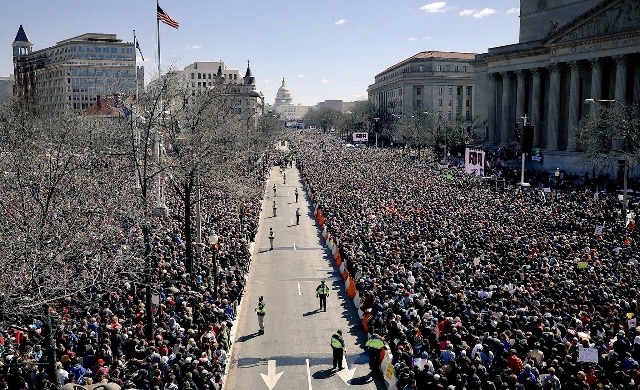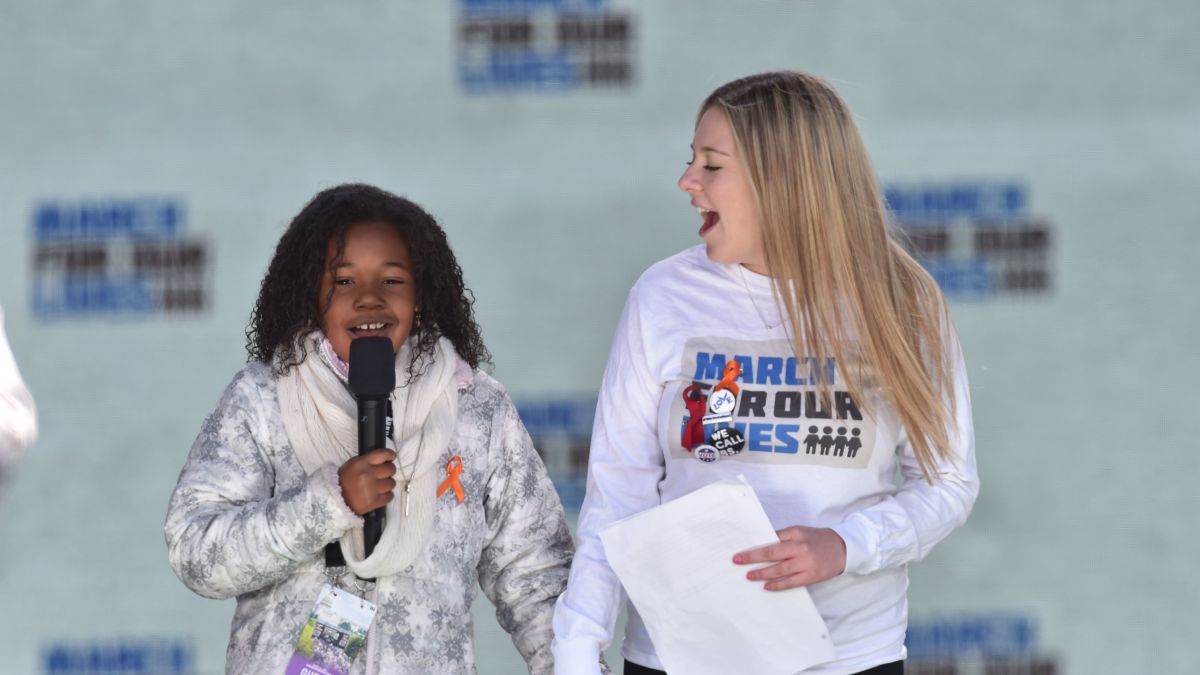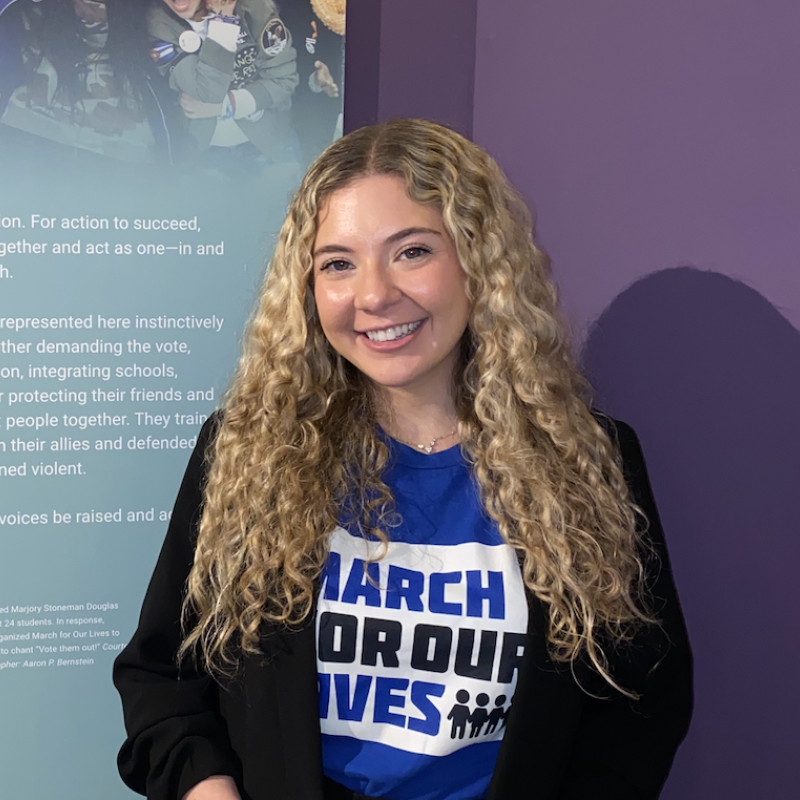Breadcrumb
In February 2018, MPP student Jaclyn Corin survived an event that would become a turning point not just for her, but for a nation grappling with the scourge of gun violence.
The mass shooting at Marjory Stoneman Douglas High School in Parkland, Florida, claimed 17 lives and galvanised a group of students, including Jaclyn, to channel their grief into a formidable call to action, co-founding March For Our Lives, a movement that not only mobilised millions for gun control but also underscored the profound impact of young voices in the public policy arena. Six years on, as an MPP student at the Blavatnik School of Government, Jaclyn continues to weave activism into her academic and career aspirations.
Early activism and formation of march for our lives
In the immediate aftermath of the Parkland tragedy, Jaclyn and her peers faced a society often numb to the regularity of mass shootings. Refusing to be silenced by grief, they recognised an urgent need for substantive policy change. March For Our Lives was conceived not just as a response to a single event, but equally as a rebuke to a culture of violence permeating American life. The movement quickly gained momentum, with students across the nation rallying under its banner, driven by the conviction that youth could no longer be sideline spectators in discussions about their safety.
Politicians and critics frequently dismissed the movement's advocates for their age, employing delegitimising language to undermine their efforts. Yet, these young activists harnessed their collective experience and emotional rawness as strengths, not vulnerabilities. They navigated the political terrain with an unyielding resolve, organising rallies across America and spearheading voter registration drives that successfully registered over 50,000 new voters. This initiative was a strategic move to reshape the political landscape to support gun control policies.
On March 24, 2018, March For Our Lives culminated in one of the largest youth-led protests in American history, drawing over a million participants in the United States alone and capturing global media attention and demonstrations of international solidarity. The movement morphed into a worldwide call to action, with 700 marches within the United States complemented by 100 more in various countries. "My friends and I were looking at all the different registrations of the marches across the world, and we were so shocked. We put everyone on a map, and we were just looking at like every corner of the world supporting us and cheering us on and screaming with us in anger," Jaclyn describes.

The movement ignited a global wave of activism, inspiring individuals like Greta Thunberg to lead their own causes. “Knowing that March For Our Lives has inspired worldwide movements deeply moves me,” Jaclyn said.
The policy impact
The movement's reach and the public's response propelled gun control back into the national conversation, leading to significant policy changes. In the wake of the movement, over 50 gun safety laws were enacted at the state level in 2018, reflecting a tangible shift in legislative action on gun control.
Jaclyn points to a pivotal achievement: the passage of the bipartisan Safer Communities Act in June 2022, the first significant federal gun safety law in three decades, catalysed in the aftermath of the Uvalde school shooting. “This was a monumental bill on a federal level, marking a significant moment in U.S. history where guns are the leading cause of death among children,” she emphasises.
“The energy and attention March For Our Lives garnered, especially from young people, pushed gun control to a level of political salience we hadn't seen before,” Jaclyn recalls. This shift was evident in the lead-up to the 2020 presidential election when March For Our Lives hosted a Democratic presidential forum on gun violence in Las Vegas, Nevada.

Jaclyn is particularly moved by personal stories of political awakening. “Young people, especially Americans, come up to me to this day and say that March For Our Lives was what put them into politics in the first place.”
Academic Pursuits and Policy Interest
"Engaging with philosophy and political theory has unveiled the importance of understanding one's own morality and the values driving our actions,"
Jaclyn Corin's journey from an advocate on the front lines of the March For Our Lives movement to a scholar at the Blavatnik School of Government encapsulates a profound evolution of purpose and perspective. Her previous academic pursuits in government and education laid the foundation, but it is at the Blavatnik School where her understanding of public policy's complexity and reach has truly deepened. Courses with departmental lecturer Ẹniọlá Ànúọlúwapọ́ Ṣóyẹmí and Professor Jonathan Wolff have tied her activism roots to theoretical frameworks, revealing the nuanced interplay between advocacy and policy-making.
"The programme has been a revelation, revealing the critical link between personal morality and professional advocacy. Engaging with my peers on tough issues has been incredibly valuable."
Vision for the Future and Advice to Young Activists
As Jaclyn looks to the future, she envisions expanding her advocacy to encompass a wider range of social policy areas beyond the confines of gun violence prevention. "I'm keen on exploring how policy can be leveraged to address complex societal issues," she states, also expressing a desire to impact local communities directly. "I believe in the power of grassroot initiatives to bring about meaningful change."
Looking Ahead
Jaclyn is looking forward to her summer project at the School, focusing on violence against women in politics. "This project represents a crucial step in my journey to understand the intersections of policy, advocacy, and social justice," Jaclyn explains.
Her time at the Blavatnik School has also instilled a deeper awareness of the global implications of American policies, reinforcing her determination to contribute positively to both national and international policy dialogues.
For those inspired by Jaclyn’s journey and looking to make their mark in activism or politics, Jaclyn advises: "Pick an area you're passionate about and start small. Local engagement offers the most direct path to tangible change." Jaclyn's story is a testament to the transformative power of education and community in turning personal tragedy into a force for global advocacy and policy change.
Jaclyn is a Michael von Clemm Scholar.

